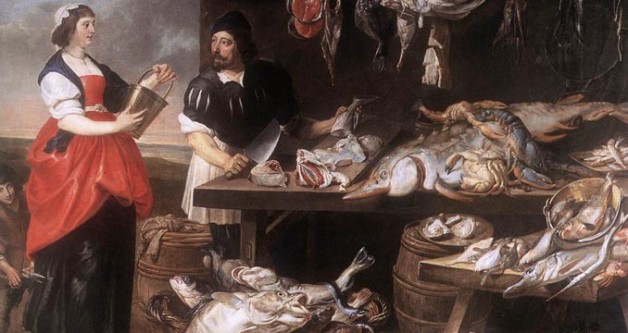Today is the first Friday in Lent, the day when Americans dust off their recipes for fish casserole and settle in for the season of penance. “Prayer, fasting, and almsgiving” is the traditional way of expressing the Catholic Lenten regime. Specifically, the Church assigns meat as something Catholics must give up on Fridays. Additionally, each Catholic usually sacrifices something that is important to himself, such as sweets, coffee, TV, or the Internet (but not of course the Dominicana Blog). These little acts of self-denial are a unifying force. Like ashes on Ash Wednesday and palms on Palm Sunday, giving up something for Lent and abstaining from meat on Fridays have deep cultural roots. But what is the purpose of our penance?
The liturgy gives us some insight. In the collects for the past three Masses (Ash Wednesday through today), we have asked for the Lord’s assistance with our penances.
On Ash Wednesday we prayed,
Grant, O Lord, that we may begin with holy fasting
this campaign of Christian service,
so that, as we take up battle against spiritual evils,
we may be armed with weapons of self-restraint.
The collect presents Lent as a war with spiritual evils that must be combated. In this context, “holy fasting” is the weapon that delivers the first volley in our Blitzkrieg on the devil. But we see that this is largely a defensive war, because we ask to “be armed with weapons of self-restraint.”
On day two of this battle with spiritual evils we are already asking God for perseverance. We are reminded that he is the source of our strength. We ask the Lord to “prompt our action,” and we recognize that our good actions “always begin” from him:
Prompt our actions with your inspiration, we pray, O Lord,
and further them with your constant help,
that all we do may always begin from you
and by you be brought to completion.
And now today we pray:
Show gracious favor, O Lord, we pray,
to the works of penance we have begun,
that we may have strength to accomplish with sincerity
the bodily observances we undertake.
Again we ask God for the strength to carry on with these penances that we have undertaken. But now the added element of “bodily observance” directs our attention to the where these penances take place. We are restraining our flesh, our bodies, in order to be free to fight the spiritual battle. But what is this spiritual battle over? What is the metaphorical ground to be gained?
Again the Masses on these three days give us the answer. In the prayer over the offerings on Ash Wednesday we ask,
As we solemnly offer
the annual sacrifice for the beginning of Lent,
we entreat you, O Lord,
that, through works of penance and charity,
we may turn away from harmful pleasures
and, cleansed from our sins, may become worthy
to celebrate devoutly the Passion of your Son.
Who lives and reigns for ever and ever.
And in yesterday’s prayer after Communion we continue in the same vein:
Having received the blessing of your heavenly gifts,
we humbly beseech you, almighty God,
that they may always be for us
a source both of pardon and of salvation.
Finally, today in the prayer after communion:
We pray, almighty God,
that, through partaking of this mystery,
we may be cleansed of all our misdeeds,
and so be suited for the remedies of your compassion.
Through Christ our Lord.
The common theme is that we are seeking to be cleansed of our sins. We are both warrior and battlefield. The enemy seeks to lure us into sin, while the practice of penance restrains our bodies so that we do not so easily give in to temptation. Through the practices of Lent we can turn over to God our lifelong defensive war with sin. God is the ultimate victor. As we pray in these liturgies, it is only when we turn to him and receive his grace that we are able to make effective use of the spiritual weapons at our disposal. Holy fasting is made holy by God.
✠
Image: Adriaen Van Utrecht, Fishmonger’s Stall







